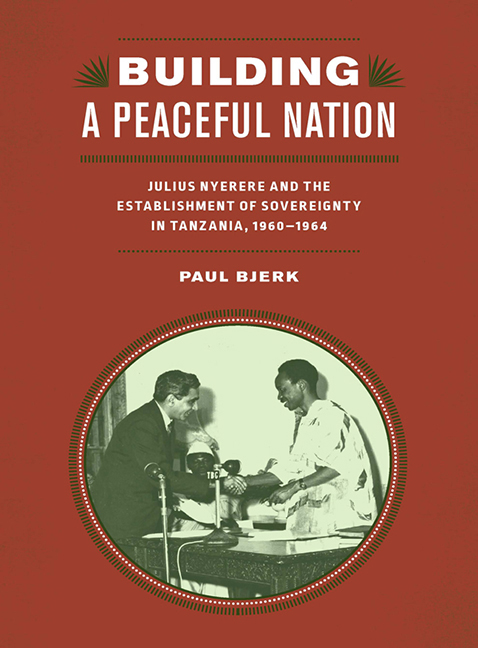 Building a Peaceful Nation
Building a Peaceful Nation 4 - The Invention of Ujamaa
Published online by Cambridge University Press: 08 May 2021
Summary
Suggesting that Tanganyika should have a single-party system for at least fifteen years after independence, Nyerere argued that the key to a sustainable democratic system was not to be found in constitutional safeguards, no matter how ingeniously devised. He had come to the conclusion that any electoral system could be easily manipulated into dictatorship, and that for a democratic system to work at all there had to be a consensus, shared among people and leaders alike, about the constraints on political decisions within the nation-state. Nyerere introduced the idea of a “national ethic” while endorsing the new republican constitution and the powerful executive it envisioned:
The safeguard of a people's right, the people's freedom and those things which they value … is the ethic of the nation… . If the people do not have that kind of ethic, it does not matter what kind of constitution you frame. They can always be victims of tyranny… . What we must continue to do all the time, is to build an ethic of nation, all the time to build an ethic of this nation, which makes the Head of State whoever he is to say, “I have the power to do this under the Constitution, but I cannot do it, it is un-Tanganyikan.”
Given the shallow constitutional tradition in the newly independent country, Nyerere sought a popular philosophy of basic civil and economic rights balanced by an ideology of citizen obligation that would define what it meant to be Tanganyikan and thus designate the limits of legitimate politics. Moreover, a philosophy of state articulated with an identifiably “African” sensibility would represent an integrative route to Africanness, as opposed to a divisive racial route. During his travels in 1962, Nyerere composed a language and logic for a national ethic that would make sense as both grassroots and cosmopolitan discourse.
Without a popular democratic tradition in place, Nyerere believed it would take time for people to learn the rhythms, pitfalls, and limitations of democratic politics, and make the necessary commitment to maintain democratic principles despite their weaknesses.
- Type
- Chapter
- Information
- Building a Peaceful NationJulius Nyerere and the Establishment of Sovereignty in Tanzania, 1960–1964, pp. 97 - 108Publisher: Boydell & BrewerPrint publication year: 2015


